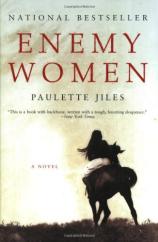Excerpt
Excerpt
Enemy Women

Chapter One
Oct. 29, 1864
Dear Wife and Children; I take my pen with trembling hand to inform you that I have to be shot between 2 & 4 o'clock this evening. I have but few hours to remain in this unfriendly world. There are 6 of us sentenced to die in retaliation of 6 Union soldiers that was shot by Reeves men. My dear wife don't grieve after me. I want you to meet me in Heaven. I want you to teach the children piety, so that they may meet me at the right hand of God... I don't want you to let this bear on your mind any more than you can help, for you are now left to take care of my dear children. Tell them to remember their dear father. I want you to tell all my friends that I have gone home to rest. I want you to go to Mr. Conner and tell him to assist you in winding up your business. If he is not there then get Mr. Cleveland. If you don't get this letter before the St. Francis River gets up you had better stay there until you can make a crop, and you can go in the dry season.
It is now half past 4 a.m. I must bring my letter to a close, leaving you in the hands of God. I send you my best love and respect in this hour of death. Kiss all the children for me. You need have no uneasiness about my future state, for my faith is well founded and I fear no evil. God is my refuge and my hiding place. Good-bye Amy
Asey Ladd
-- Asa Ladd, a Confederate prisoner of war in Gratiot Street Prison, St. Louis, who was selected along with five others by the Union command of that city to be executed in retaliation for Reeves's execution of Major James Wilson of the Union Militia. Ladd was from southeastern Missouri.
It was the third year of the war and by now there was hardly anybody left in the country except the women and the children. The men were gone with Colonel Reeves to live in the forests, and many families had fled to Texas or St. Louis. Abandoned house places looked out with blank windows from every hollow and valley in the Ozark mountains so that at night the wind sang through the disintegrating chinking as if through a bone flute.
Adair Colley had just turned eighteen in early November of 1864 when the Union Militia arrested her father and tried to set the house on fire. Her sister Savannah saw them first; a long line of riders in blue trotting in double column as they turned into the road that led to the Colley farm.
All through the last three years of the war Adair's father had tried to keep his children close to home. Because he was a justice of the peace, he was called Squire, and the newspapers he subscribed to came addressed to Squire M.L. Colley. Her father had determined to stay out of the war and keep his children out of the reach of soldiers of either army and he had succeeded in this for three years. He read in the Little Rock paper that the Missouri Union Militia was being thrown together out of troops dredged up from the riverfronts of St. Louis and Alton, from the muddy Missouri River towns. Men who joined up for a keg of whiskey and five dollars a month.
The trained and disciplined Union troops had long ago been sent to the battlefields of the East, to Virginia and Tennessee, while the hastily recruited Militia had been sent down into the Ozarks to chastise the families whose men had gone to the Southern Army, to catch and arrest them when they returned from their six-month enlistments, and to punish those who might be suspected of harboring Southern sympathies.
Adair's father did not know what the law was on this matter, concerning men who had been in the Southern Army and had returned home and were soldiers no longer, or those who had never joined up at all but had no means of proving it. But it was no matter, for the Union Militia knew no law. After they burnt down the courthouses they then began to ambush the mail carriers, so the southeastern Ozarks seemed a place cut off from the entire world.
Adair's father read to them in the evenings out of the rare newspaper he managed to acquire, the Memphis Appeal and the St. Louis Democrat. Adair sat on the clothes trunk to stare at the fire and listen to the inflamed prose of the Democrat. She would rather he read the racing news from the Nashville paper, for she wanted to hear if Copperbottom's sons were running but the war consumed everything, even human thoughts and horse races.
There are four main rivers coming down out of the southeastern Missouri Ozarks into the Mississippi. They are the Eleven-Point, the Current, the Black, and the Saint Francis. For three years Adair had seen at a distance soldiers of both armies riding up these river valleys in search of one another. Her brother, John Lee, rode to the ridges to stand watch for them every morning, for the Fifteenth Missouri Cavalry under Colonel Reeves would take your horses as quick as would any Militia. He watched for their smoke, at dawn when the soldiers would be lighting their breakfast fires. He did not go to war himself for he had a withered arm. So the Union Militia raided and set fire to the outlying places all around the Colley farm but continued somehow to miss them.
All through this time Adair's father remained absorbed in his books of law, his newspapers passed from hand to hand down the Wire Road or the Nachitoches Trace by...
Enemy Women
- paperback: 336 pages
- Publisher: Harper Perennial
- ISBN-10: 0060938099
- ISBN-13: 9780060938093








